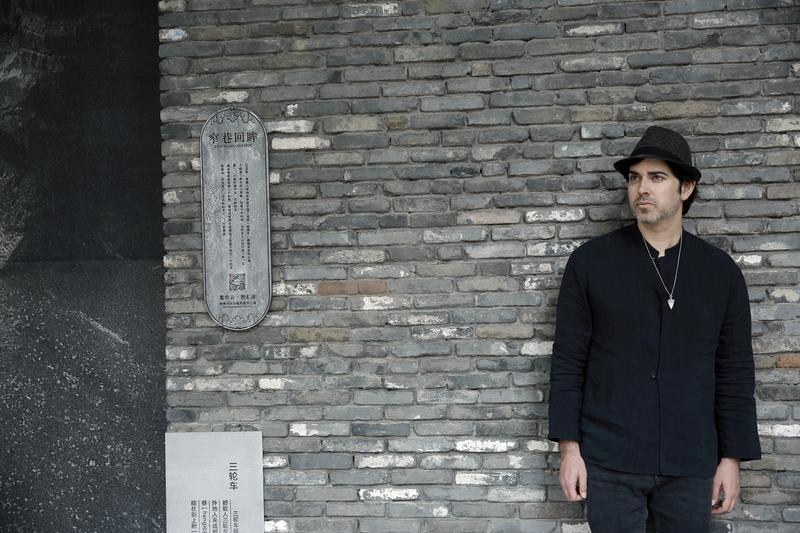An Israeli musician's videos from across China bring out the cultural features of provinces and regions, Xu Lin reports.
 Segev has visited China over 20 times, including a trip to Chengdu, Sichuan province, in 2018. (PHOTO PROVIDED TO CHINA DAILY)
Segev has visited China over 20 times, including a trip to Chengdu, Sichuan province, in 2018. (PHOTO PROVIDED TO CHINA DAILY)
Israeli singer-songwriter Gilad Segev has dedicated himself to an ambitious project to present different perspectives of China via music, because of his love for the country.
In June 2020, he launched Project 34, through which he will release a song for each of the 34 provincial-level regions in China every month, with every one encapsulating each place's characteristics. Combining Chinese music and global folk music, he has unveiled 17 videos online so far, including on YouTube and major Chinese social media platforms, gaining millions of views.
"My inspiration for the project was the great beauty I discovered in China's culture, landscapes, and more importantly, the hearts of Chinese people," says Segev, 47, who lives in Jerusalem, Israel.
He has nearly 1 million followers on Chinese micro-blogging platform Sina Weibo.
"I want to tell the story of this beauty and express my love for it. As China is such a vast country, I need to express its richness by focusing on different places."
He calls himself a "passerby"-a traveling artist who tells his stories from his encounters with people from various cultures, through music.
Over the past decade, the award-winning musician has visited China over 20 times to perform across the country. He has traveled to most of the 34 provincial-level regions, and plans to go to the rest when travel is not restricted by the COVID-19 pandemic.
"With creativity and the help of many people, we are able to continue the project, although now I can't travel to China due to the pandemic," he says.
For each music video, he cooperates with a Chinese vocalist or musician, to combine characteristics from their own home region. He and his team have listened extensively to various genres of Chinese music to figure out what suitable elements can be used in his works.
"Finding this combination is the foundation of the emotional bridge I want to build in Project 34, a bridge to all provincial-level regions in China, and also among all people of our world," he says.
The first is to find the key elements-the beauty of local culture, landscape and people's character that represent a place best-via in-depth research. After that he decides on the main musical elements and finds a suitable artist from the area to collaborate with. When he writes the lyrics, he tries to find the words that go best with the landscape and feelings he has about the place.
"I try to be true to my own feelings and perspective," he says.
 Israeli singer Gilad Segev performs with Chinese singer Ha Hui in Shanghai in June 2019. (PHOTO PROVIDED TO CHINA DAILY)
Israeli singer Gilad Segev performs with Chinese singer Ha Hui in Shanghai in June 2019. (PHOTO PROVIDED TO CHINA DAILY)
In the song about Hubei province, a Chinese musician plays guqin (Chinese zither), together with Segev's piano playing.
The use of guqin is inspired by a legend in Hubei about the friendship between musician Yu Boya and woodcutter Zhong Ziqi, during the Spring and Autumn (770-476 BC) and Warring States (475-221 BC) periods. Zhong understood Yu's music exactly as Yu wanted to express himself. Later, when Yu learned about Zhong's death, he broke his guqin and never played the instrument again.
Segev is amazed by Fuqi Shuangshuang Bajiahuan ("husband and wife come back home together"), a classic aria of Huangmei Opera, originating in Anhui province. It connects him to the times when he has to leave home for trips. Appreciating the beauty of Chinese language via the art form, he decided to sing the song about Anhui in Mandarin.
Most of his songs in the project are in English because he wants to present them to a larger audience.
"My impression of China only gets better the more I travel there. The reason is that I enjoy China's variety of beauty, but still see its identity as a whole country. It shows that people all over the world can keep their diversity and still feel as one."
He says he sees commonalities between Jewish and Chinese people. Both have thousands of years of heritage and attach great importance to family values and education. Many Chinese social media users comment on his posts that they are moved by the songs and want to visit these places themselves.
He says that he finds audiences in China, and other countries, have discovered a side of the nation that they didn't know before.
"I hope the project will inspire people from outside China to love it like I do, and for people in China to get to know it better. Most of all, by connecting each part of China to the world using folk music as a bridge, I hope it will inspire people to enjoy the beauty."
He says people learn about other countries via news, which is mostly political.
"No one talks about the beauty of Sichuan province, the futuristic scenery of Shanghai, or the oasis in the Ningxia Hui autonomous region," he says. "Therefore, Project 34 is a big surprise to many people.… China's beauty creates the best impression for all to see."
One of his Chinese fans once translated a Hebrew song of his into Chinese and posted it online. He contacted her and filmed her singing in Chengdu, Sichuan province. He puts her video on a big screen while he sings the song onstage.
"I am so happy that such amazing, talented people can use my platform to let their voices be heard. When all of our voices are heard together, true harmony can happen," Segev says.
Contact the writer at xulin@chinadaily.com.cn


